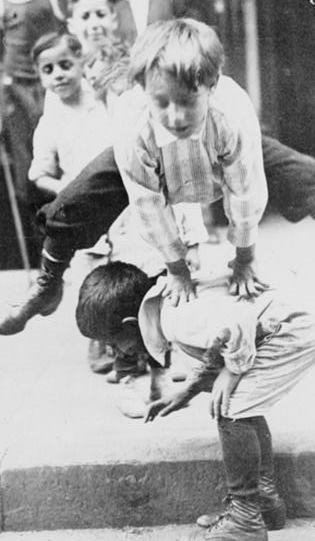In our son's elementary school, they don't describe people as black or white. And I suppose it's not something that comes up much at home. So it has been interesting to hear my son describe his classmates. He notices a lot, but has no preconceived notions about those observations.
For example when describing an older teacher at school, he didn't say she was old, instead he said she had "lines around her mouth". Or when talking about a black classmate, he would say he noticed how she talked rather than that her skin was brown.
So last week, I heard him describe someone as "black" for the first time. Before that he might say that so and so was "tan" or describe some other aspect of the kid, such as braided hair.
We did hear one black classmate describe a family as "peach", which my wife and I thought was funny. And just yesterday I found myself explaining to my son not to assume that a person was "Chinese", because of their looks.
He got until age 7 before he learned these descriptors. So far however, I don't think the terms have any baggage. Maybe it will never come.
Well, we can hope. So far, I'm pretty optimistic.
21 April 2008
Subscribe to:
Post Comments (Atom)






5 comments:
My daughter in preschool used to say 'one of the brown kids' when she was talking about a classmate who was black. My husband and I thought this was hilarious. I think she was in kindergarten before she started saying 'black.'
I don't think it is necessarily a problem to refer to someone as 'black.' It is all in how it is used, like much of the English language.
Personally I think it is better to refer to someone as 'black' rather than 'African-American.' First of all they could be visiting from another country and thus not be American. Secondly, they could have come from South America, Europe, or a whole host of other places. Just my 2cents.
When I was 5 we went on an excursion from my small town to a department store in Columbus. I announced to my mom, "There are a lot of brown people in this store!" She thought it was totally hilarious.
I wish I could recall this memory better, because there were so few black kids in my hometown that it's possible this is the first time I'd ever encountered people who looked different from me in person. I think I remember being surprised that there were so many of "them."
Which makes me want to make sure that if I ever have kids, they don't go the first five years of their life without encountering someone whose skin is a different color.
Rando, I'm not saying black is the wrong term, not at all.
I'm just observing at which age they start using these terms to group people. It's kinda sad it has to happen, but it is also interesting to see how they come to terms with these things.
I think some of his new language may go back to February when at school and at home discussed MLK day and the civil rights movement.
Another funny distinction that our son would make is he would refer to someone who is black as "people with black faces". I guess since it's the most prominent feature, the face alone stuck him as being a different color. But it also felt like it was a purely cosmetic distinction to him, such as having brown hair or glasses. It didn't pervade their whole persona.
Another illustration of the plasticity of youth occurred last year when his kindergarten teacher asked me several times throughout the year if someone in our family was from the south. I could not figure out what she was talking about at first but finally she remarked it was because he would often adopt a southern-sounding accent and I realized this was a dialect he picked up at school or in the nieghborhood but used primarily with his peers so we didn't hear it much at home. His distinction was not so much one of race, he used indiscriminately with black and white children, but one of age, he used it to talk with other kids.
Post a Comment